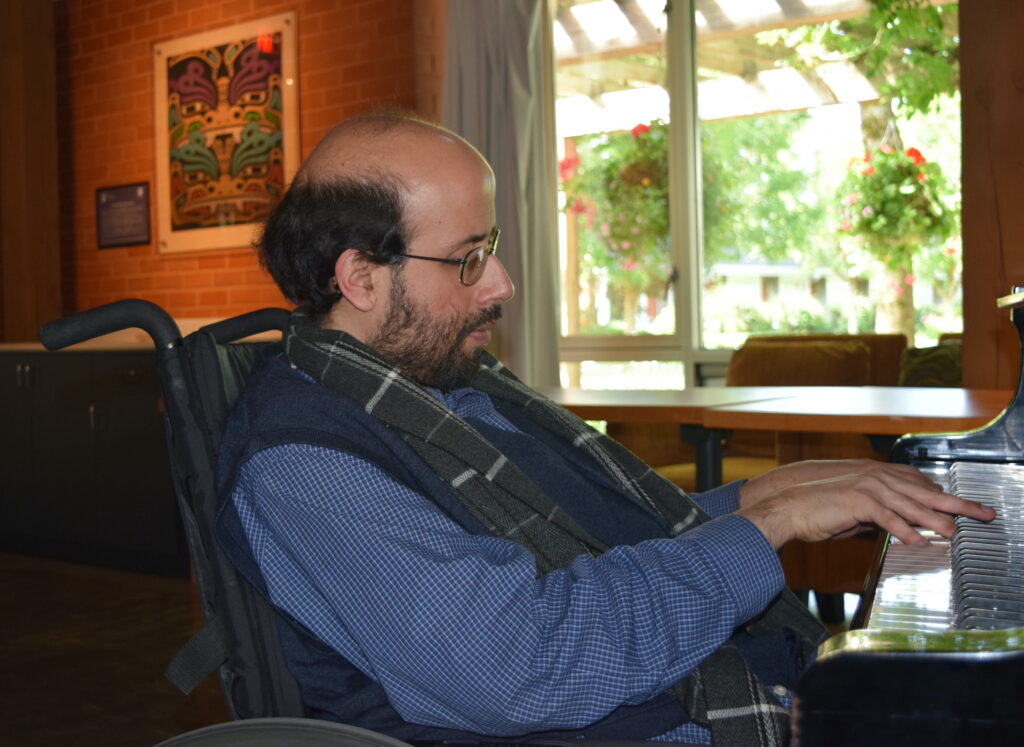As part of the podcast series, “ArtsAbly in Conversation,” Diane Kolin interviewed Dr. Stefan Sunandan Honisch, Sessional Instructor in the Department of Theatre and Film, at the University of British Columbia. His research interests are at the intersection of Critical Disability Studies, Music, and Critical Pedagogy.

Photo credit: Jane Wang, St. John’s College, University of British Columbia, 2017.
This post presents the resources that he mentioned during the conversation.
Dr. Stefan Sunandan Honish’s academic page
Stefan Sunandan Honisch is a Sessional Instructor in the Department of Theatre and Film, at the University of British Columbia, having previously held a Banting Postdoctoral Fellow within the department for a project on the musical life of Helen Keller (1880-1968). His research interests are at the intersection of Critical Disability Studies, Music, and Critical Pedagogy. His first monograph project Vulnerable Virtuosities: Disability in Concert and Competition (under contract with University of Michigan Press) uses a Disability Justice framework to explore how blind virtuoso pianists radically challenge stubborn dualisms of musical strength and weakness, demonstrating that vulnerable manifestations of disabled embodiment intensify the aesthetic and expressive power of musical virtuosity.
Stefan Sunandan Honisch plays two Schubert Impromptus
Franz Schubert: Op. 90, D. 899: No. 3 in G-Flat Major, Andante, and No. 4 in A-Flat Major, Allegretto. Benefit concert in support of Syrian Refugees, West Point Grey United Church, Vancouver, BC. Performed by Stefan Sunandan Honisch on October 18th, 2015.
If the video doesn’t play, click on this link to watch it directly on YouTube: Stefan Sunandan Honisch plays two Schubert Impromptus
Accessibility in Research: From Design to Dissemination
On May 22nd, 2022, Stefan Sunandan Honisch and Gwen Thompson Hill presented an overview of Royal Roads University’s new toolkit, Accessibility in Research: From Design to Dissemination.
People with disabilities account for more than 22 per cent of Canada’s population. If we want to make our research meaningful, we need to include this large and diverse group of Canadians. The toolkit offers ways to design and plan your research for accessibility.
If the video doesn’t play, click on this link to watch it directly on YouTube: Accessibility in Research Toolkit
Demanding Kinder Classrooms Doesn’t Make You a Snowflake
Article by Daniel Heath Justice on kindness and gentleness in university teaching. This article guides Dr. Stefan Sunandan Honisch’s approach to teaching.
Dr. Stefan Sunandan Honisch interviewed by UBC Journalism in 2022
Dr. Stefan Sunandan Honisch interviewed by UBC Journalism students on November 4th, 2022 at St. John’s College, University British Columbia. The interview took place in the Fairmont Social Lounge. Published with authorization.
If the video doesn’t play, click on this link to watch it directly on YouTube: Dr. Stefan Sunandan Honisch interviewed by UBC Journalism in 2022
Helen Keller’s poem “A Chant of Darkness”
“A Chant of Darkness” as published in Century Magazine, (May, 1908)
The following lines were originally a passage in the first draft of Miss Keller’s essay, “Sense and Sensibility,” which was published in The Century Magazine for February and March. As Miss Keller developed the thought, her style became dithyrambic, and made a poetical chant which stood out from the prose. Her friends advised her to take the passage out and reshape it into a loose stanzaic structure. The original passage began with a quotation from Job, the idea being that Job lived through affliction and darkness to win new faith, and that there is yet another faith which finds joy in the midst of darkness. Miss Keller’s lines are seen to be a blending of her imagination with passages from Job and, to a less extent, from modern poets. The quotations from Job are the foundation from which springs Miss Keller’s own chant of faith, the text on which she has constructed her poem with a definite autobiographic intention. — The Editor.
“I did not intend to set up as a poet”: Helen Keller’s “A Chant of Darkness”
Talk by Stefan Sunandan Honisch at the Wiley Hitchcock Institute for Studies in American Music.
“In ‘The Chant of Darkness’ I did not intend to set up as a poet.” Helen Keller’s modest words obscure the ambition and scope of the lyrical text with which she concludes her 1908 book The World I Live In. This talk, connected to Honisch’s postdoctoral research, examines Keller’s poem alongside two of its musical settings. The first, an Italian translation by Cesare Sodero, received its first performance at BAM in 1919. The second, by Philip Greeley Clapp, was first performed in 1935 at the State University of Iowa. Clapp played his setting for Keller in 1929 and, later, he wrote her a letter attributing the composition’s extended genesis “to the beauty, power, and eloquence” of her poetic utterance. Through a close reading of Helen Keller’s “A Chant of Darkness” and its musical incarnations, Honisch argues that these chants resound across the “vast, unanswering dark” in a multi- voiced dialogue with “The Book of Job” that Keller envisions as a place of both origin and return.
f the video doesn’t play, click on this link to watch it directly on Vimeo: Stefan Sunandan Honisch at the Wiley Hitchcock Institute
Book project: art cover
This collection includes a 2010 landscape painting by Martin Honisch (Stefan’s father), envisioned as the cover image for “Vulnerable Virtuosities: Disability in Concert and Competition.”
Nobuyuki Tsujii
Nobuyuki Tsujii is a Japanese pianist and composer. He was born blind due to microphthalmia. Tsujii performs extensively, with a large number of conductors and orchestras, and has received critical acclaim for his unique techniques for learning music and performing with an orchestra while being unable to see.
Maria Theresia von Paradis
Maria Theresia von Paradis was an Austrian musician and composer who lost her sight at an early age, and for whom her close friend Mozart may have written his Piano Concerto No. 18 in B-flat major. She was also in contact with Salieri, Haydn, and Gluck.
Read more about Maria Theresia von Paradis on Classic FM’s website
Debra Saylor
Debra Saylor is a pianist, singer, and teacher based in the US. She was born in Dubuque, Iowa. She attended Clarke College in Dubuque, where she received her BA in piano and vocal performance in 1984. In 1986, Ms. Saylor received her MA in piano and vocal performance from the University of Iowa in Iowa City.
On January 22, 2021, she was the host of Dr. Stefan Sunandan Honisch for a talk entitled “The Art of the Piano: Competition, Teaching and Performance.”
If the video doesn’t play, click on this link to watch it directly on YouTube: The Art of the Piano: Competition, Teaching and Performance – An Afternoon with Debra Saylor
Bernard d’Ascoli
Bernard d’Ascoli was born in the South of France and began learning piano and organ at the age of eleven. In 1974 he was the youngest French Baccalaureat graduate of the year and four years later, at the age of nineteen, he won the First Prize in the Barcelona International Piano Competition. He first came to major public attention in 1981 when, following his Third Prize in the Leeds International Piano Competition, he made his London debut both in recital and with orchestra and recorded the Liszt sonata and other works for EMI, later re-issued on CD.
Alberto Mozzati
Alberto Mozzati studied the piano at the Institute for the Blind in Milan, where he had the famous Maestro Emilio Schieppati as a teacher. He graduated with full marks from the prestigious Giuseppe Verdi Conservatory (Milan) in 1934. From that moment, he began an intense concert activity throughout Europe. Alberto Mozzati’s career was not limited to concert activity alone: in addition to teaching at the Institute for the Blind in Milan, he also taught at the Milan Conservatory and the Parma Conservatory, as well as at piano specialization courses at Sitges (Barcelona). He was also active as a juror in piano competitions.
Listen to Alberto Mozzati’s performance of his Chopin recital
Van Cliburn competition for outstanding amateur pianists
This competition brings together the best amateur pianists from around the world for seven days of performances, symposia, and social events.
Julietta Singh
Julietta Singh is Associate Professor of English at the University of Richmond. She is a writer and academic who works at the intersections of postcolonial studies, feminist and queer theory, and the environmental humanities.
Canadian Accessible Musical Instruments Network (CAMIN)
Disabled people/people with disabilities often encounter physical and social barriers to making music. These barriers include, but are not limited to instruments, spaces, and social environments. As a result, people with disabilities experience ableism—discrimination based on ability biases—and therefore do not have equal access to making music compared to nondisabled people. To address these access issues, the Canadian Accessible Musical Instruments Network (CAMIN) partners academic and non-academic members with expertise in disability, music, technology, education, and research.

